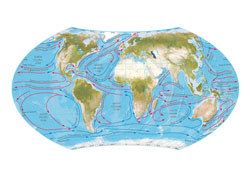Understanding climate change's undercurrents
Owing both to human activity and natural cyclical variations, the global climate is changing with significant implications for the world's oceans. Not only are sea levels rising, but ice cover in the Arctic Sea is also shrinking. According to one study, the North Atlantic Drift, which keeps Europe warm, has weakened by 30 % over the past decade. However, in light of the paucity of observations, it is unclear whether this is a product of the limited observations or an actual trend, and what exactly is causing it. Ascertaining this, and other changes to the marine environment, requires constant and continuous monitoring of the oceans. ARGO — the first-ever international global ocean observing system (GOOS) based on an array of around 3 000 autonomous floats worldwide — is an important component of this sophisticated information-gathering infrastructure. Although ARGO has been collecting invaluable data since 1999, ensuring its continued operation for the coming decades is a major challenge. With EU backing, the 'Global ocean observing infrastructure' (EURO ARGO) project paved the way for the organisation and consolidation of Europe's role in this global research network. More specifically, this preparatory phase sought to ensure that Europe would be able to deploy, maintain and operate an array of 800 floats by 2012. Towards that end, EURO ARGO worked to develop a long-term agreement between Member States and other funding agencies for the network's operation. The project partners decided that this European research infrastructure would be distributed across a number of countries. In addition, the project considered future developments in float and sensor technologies and identified areas for improvement. Sampling strategies for Europe's various seas were also analysed. Modelling how climate change affects the oceans requires regular, high-quality monitoring. EURO ARGO has helped pave the way towards making this a reality in Europe.



